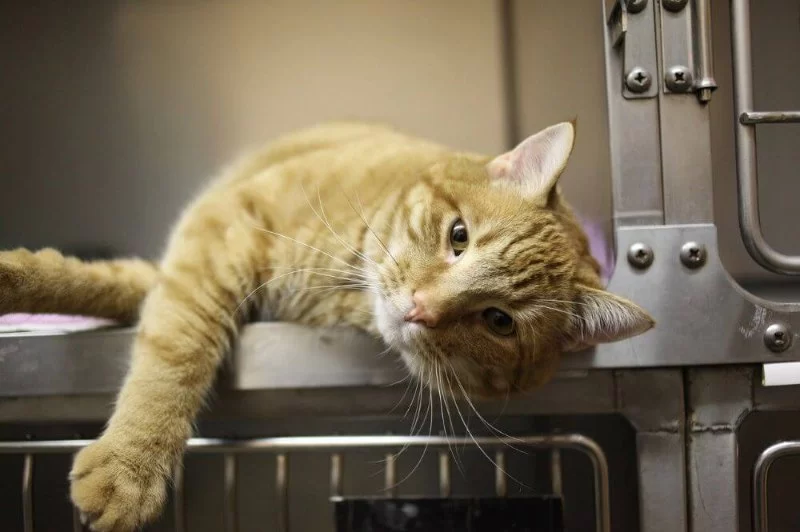#understanding-feline-chronic-pancreatitis - understanding-feline-chronic-pancreatitis
#early-signs-you-should-watch-for - early-signs-you-should-watch-for
#how-vets-diagnose-chronic-pancreatitis - how-vets-diagnose-chronic-pancreatitis
#real-stories-about-cats-living-with-pancreatitis - real-stories-about-cats-living-with-pancreatitis
#treatment-options-that-actually-help - treatment-options-that-actually-help
#daily-home-care-tips-for-supporting-your-cat - daily-home-care-tips-for-supporting-your-cat
#when-to-seek-advanced-care - when-to-seek-advanced-care
Understanding Feline Chronic Pancreatitis
Learning how to recognize and treat pet feline chronic pancreatitis is something every cat owner eventually comes across—especially as their pets age or begin showing subtle shifts in behavior. Chronic pancreatitis occurs when the pancreas becomes persistently inflamed, affecting both digestion and insulin regulation. Unlike acute pancreatitis, which appears dramatically and urgently, chronic pancreatitis creeps in quietly and often goes unnoticed until symptoms worsen.
Cats are notoriously private about their pain. Their instinct is to hide weakness, making it even more important for owners to understand what is normal and what isn’t. Many cases of chronic pancreatitis develop slowly over months or even years, which is why early recognition is key to giving your cat a more comfortable life.
Veterinarians often note that cats with pancreatitis have overlapping conditions such as inflammatory bowel disease or liver inflammation, making diagnosis complex. That’s why staying informed—and observing your cat closely—can significantly improve the outcome.
Early Signs You Should Watch For
The earliest signs of feline chronic pancreatitis can be incredibly subtle. Cats may show mild lethargy, hide more often, or lose interest in favorite activities. While none of these alone signal pancreatitis, collectively they suggest something deeper is happening.
More specific indicators include reduced appetite, vomiting, weight loss, and abdominal discomfort. Many owners describe their cats sitting in a “prayer position” with their front legs stretched forward—an intuitive attempt to relieve abdominal pain. These signs may come and go, which confuses owners into believing the issue resolved on its own.
One cat owner shared that their previously enthusiastic eater began eating only half his breakfast. Weeks later, the cat lost noticeable weight, prompting a vet visit that confirmed chronic pancreatitis. That story resonates with many because it demonstrates how easy it is to overlook early symptoms.
How Vets Diagnose Chronic Pancreatitis
Diagnosing chronic pancreatitis in cats isn’t straightforward. Unlike dogs or humans, cats often have normal bloodwork despite significant inflammation. This is why vets rely on a combination of history, physical exams, specialized blood tests, and ultrasound imaging.
One of the most effective diagnostic tools is the feline pancreatic lipase test (fPLI). When combined with ultrasound findings, vets gain a clearer picture of the pancreas and surrounding organs. Sometimes sedation is required, especially if your cat is anxious or uncomfortable, but the process is generally safe and quick.
Hidden Brook Veterinary and similar clinics typically use a multi-layered diagnostic approach to avoid missing related conditions, helping your veterinary team craft a more accurate and effective treatment plan.
Real Stories About Cats Living With Pancreatitis
There are countless real-life examples of cats living well with chronic pancreatitis. One widely shared online story involved a senior cat named Milo whose owner noticed he gazed at his food dish but wouldn’t eat. After proper diagnosis and treatment, Milo returned to his normal routine of sunbathing and greeting guests at the door—proof that early intervention works.
Another case making rounds in pet forums involved a rescue cat who was constantly vomiting. Her new family assumed it was “just stress” until a vet diagnosed chronic pancreatitis. With routine medications and diet adjustments, she stabilized and even gained healthy weight.
These stories reassure owners that with proper care, chronic pancreatitis is manageable and does not have to diminish a cat’s quality of life.
Treatment Options That Actually Help
Treating feline chronic pancreatitis requires a combination of medical care and ongoing symptom management. Anti-nausea medications, appetite stimulants, pain control, and specific nutritional changes form the backbone of treatment. In many cases, low-fat, easily digestible diets make a significant difference.
Some cats require vitamin B12 injections, while others benefit from steroids to reduce inflammation. Your vet may also recommend probiotics or digestive enzymes to support gut health. The key is consistency—nothing works overnight, but steady management can stabilize your cat over time.
If you’re unsure which products or therapeutic diets are right for your cat’s condition, browsing pet wellness solutions from Hidden Brook Veterinary can help you identify trusted options recommended by professionals.
Daily Home Care Tips for Supporting Your Cat
Care at home is just as crucial as medical treatment. Hydration plays a huge role in managing pancreatitis, so adding wet food, broths, or veterinarian-approved electrolyte supplements can help. Smaller, more frequent meals reduce strain on the pancreas while maintaining steady energy levels.
Environmental comfort is equally important. Cats with pancreatitis tend to seek warmth and quiet, so creating a soft, stress-free resting area can help them feel safe. Avoid sudden food changes, as sensitive digestion can easily trigger flare-ups.
Owners often find success with routine weight checks, consistent feeding schedules, and close monitoring of appetite changes. These habits allow you to catch early warning signs before symptoms escalate again.
When to Seek Advanced Care
If your cat stops eating for more than 24 hours, experiences repeated vomiting, or seems unusually weak, it’s time to contact your vet immediately. Chronic pancreatitis can flare suddenly, and quick intervention prevents complications like dehydration or secondary infections.
For more complex cases, advanced diagnostics, hospitalization for fluids, or long-term management plans may be necessary. Hidden Brook Veterinary and similar clinics offer specialized care tailored to cats with chronic digestive conditions.
Understanding how to recognize and treat pet feline chronic pancreatitis empowers you to become an active advocate for your cat’s health. With awareness, early intervention, and consistent care, most cats can enjoy long, comfortable, and loving lives—even with a chronic diagnosis.












